He’s been a certified diver for nearly five decades, traveling to dive sites and shops in every corner of the world, carrying with him DAN’s mission to enhance diver safety. A stalwart educator, he was integral in the development and introduction of dive-safety education programs. After holding a variety of leadership positions at Divers Alert Network®, including president and CEO and, most recently, president emeritus of The DAN Foundation®, Dan Orr is retiring from DAN® this fall, but his legacy will continue to inspire divers for decades to come.
“People often ask me where is my favorite place to dive, and I just say, ‘well, the water,'” Orr said. “No matter where I am, there is something unique about that place. My philosophy now is to treat every dive like it’s my first — it’s that exciting.”
The first dive he ever made was in Miami, Fla. It was 1958, and 11-year-old Orr and a friend equipped themselves with two masks, one regulator and one tank “borrowed” from his neighbor’s older brother. With finless feet, they jumped in from the rocky shoreline to explore the depths of Biscayne Bay and search for hidden treasures — just like they’d seen the stars of Underwater! do on the screen of their local drive-in theater.
“I remember when the movie came on; as far as I could see in every direction was the underwater world,” Orr said. “There were people swimming around a sunken Spanish galleon — pristine after hundreds of years beneath the sea and teetering on a precipice. There was treasure inside it, and these scuba divers were hunting for it. It was just tremendously exciting. After that movie, literally everything I saw in the water had to be treasure.”
Though he did not take out his neighbor’s gear again, Orr continued to explore Florida’s waters, snorkeling and swimming along its shores. “I was always cautious around the water,” Orr recalled. “To be perfectly honest, I think I was a little bit afraid of it.”
He was first introduced to water safety one tragic summer when three of his classmates drowned in separate incidents. His school implemented a mandatory water-survival class. Each day Orr and his classmates would practice skills at the local pool with a Marine Corps pilot who had survived several days in the open ocean after being shot down. “We had to jump off the high dive into the pool, fully clothed, and stay afloat for 30 minutes,” Orr remembered. “For the first time, I felt real comfort in the water, because I knew whatever happened I could stay afloat with the skills I learned.”
In the early ’60s Orr’s family moved to Dayton, Ohio, and for Dan’s 17th birthday his parents enrolled him and his brother Tom in a National Association of Underwater Instructors (NAUI) diving certification course. Equipped with training and a passion to explore, the brothers eagerly sought diving opportunities. They volunteered as public safety divers, worked on support teams for hydroplane races and even did some contract commercial work for the city of Sandusky, Ohio.
When Orr was 18, he left college and enlisted in the Navy, hoping to join the Underwater Demolition Team, but Orr’s ship, the USS Steinaker, was soon deployed on a 10-month combat tour to Vietnam. He joined the deck force and became a boatswain’s mate in addition to working as a rescue swimmer. When Orr returned to the U.S., he took the opportunity to go on reserve duty so he could finish his studies.
Learning to Teach
While in school at Wright State University (WSU), Orr met Bill Kessen, owner of Kessen Underwater Specialties in West Carrollton, Ohio, who he and his friend Gordon Jump began helping as pool assistants. Orr enjoyed assisting Kessen during scuba classes and continued his own training with advanced courses. Then one night in 1971 Kessen didn’t show up at the pool; after calling Kessen’s house, Orr learned that he had suffered a heart attack and died.
Devastated by Kessen’s death, Orr and Jump continued to help at the shop, and Kessen’s widow asked if they would be interested in becoming instructors. “I had really never thought about becoming one,” Orr said, “but she offered to pay our way, and we accepted.” They attended the YMCA Instructor Institute in Cincinnati and were certified as YMCA and Professional Association of Diving Instructors (PADI) scuba instructors in 1972.
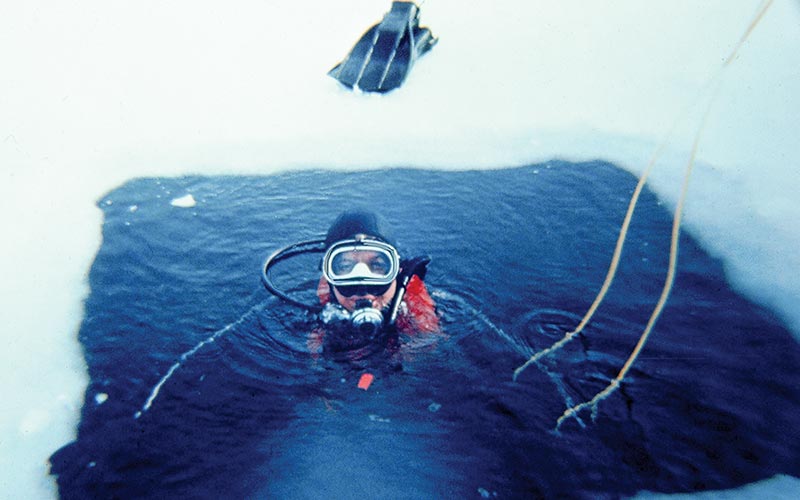
“I always imagined I’d become a researcher or a marine biologist until that first time I stood in front of students as a certified instructor,” Orr said. He taught at the dive shop while working to complete his undergraduate degree and continuing his service in the U.S. Naval Reserve. The Vietnam War was ending; with few officer billets available, Orr opted to remain in the Reserve and become a Navy-qualified diver so he could train his unit, adapting the courses and adding elements to make them more comprehensive. He began training more local groups, including the U.S. Air Force’s recreational dive club.
Meanwhile, WSU built a swimming pool, and Orr inquired about the establishment of a scuba program. After he trained the aquatics director, Orr was asked to run the university’s scuba program, which offered its first course in 1974. “By the time I left there 14 years later, it was probably the most comprehensive college-level diver education program available in the country,” Orr said. “We offered any aspect of training we could think of to enhance diver education. You could come in as an entry-level diver and continue through instructor courses.” His program featured in-depth lectures, pool practice and hands-on application of real-world skills during class trips. Over the years, more than 10,000 students were certified through the program — including some of the first disabled scuba students.
Committed to Safety
In addition to pioneering WSU’s scuba program, Orr continued his studies there and earned his master’s degree in biological sciences. With the guidance of his mentor Lee Somers, Ph.D., he also became involved in the diving industry as a NAUI Instructor Trainer, a YMCA field representative and the YMCA scuba commissioner of the Great Lakes region.
“I was like a sponge. Every time we’d go to a quarry, I would go around and talk to everybody. I wanted to know everything they knew, how they were teaching, what skills they had and what rescue equipment they used,” Orr said. “Safety was always very important to me; we had oxygen equipment before it was popular, as well as backboards and all sorts of first-aid equipment. I’d always walk around to introduce myself and let people know we had emergency supplies available if they needed them.”
Emphasizing safety protocols in his courses, Orr implemented emergency action plans before their use was standard. He’d run practice drills and live scenarios, compelling his students to manage realistic situations from start to finish. “The worst thing I could ever imagine would be to have one of my students die,” Orr explained. “I knew people who had died while diving, including my entry-level instructor and his assistant who died during a cave dive, and I wanted to know why. I tried to get as much information as I could about any accident I heard about to learn what had gone wrong and how to avoid it. I wanted to make sure my students were as prepared as they possibly could be with the tools, skills and knowledge they would need to solve any problems they might face.”
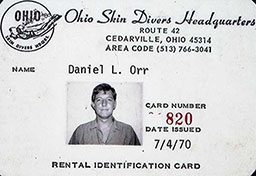
As Orr pursued educational interests and a career in diving, he struck up a relationship with fellow biological sciences graduate student Betty Huffman. They spent several months conducting fieldwork together, and eventually he taught her to dive. “She probably got it worse than everybody else in the class; I wanted to make sure there was no favoritism, and I think I pushed her harder than any of my other students,” Orr said. Soon Huffman was an assistant instructor, helping with Orr’s courses at WSU and traveling with him on the skills-focused dive trips. She led the surface support teams, tracking everyone’s dive profiles and teaching others how to play that significant safety role. “We tried to keep it like a family,” she remembered. “We would host holiday meals for ‘orphaned’ divers stranded at school. There was always someone crashing at our house, and if somebody couldn’t afford the training, we’d figure out odd jobs for them to do so they could ‘pay’ for their courses.”
At a convention sponsored by the Ohio Council of Skin and Scuba Divers in 1983, Orr was giving a presentation on dive accident management when he first met Peter Bennett, Ph.D., D.Sc., founder of Divers Alert Network (originally called the National Diving Accident Network). “I was waiting in the hallway and introduced myself to Dr. Bennett,” Orr recalled. “He asked if my talk would include a slide about DAN. It was the first I’d heard of it, but after our discussion I decided to add it to my presentation.” Bennett asked Orr to join the fledgling organization as a volunteer regional coordinator and volunteer instructor. Orr was DAN member number 10.
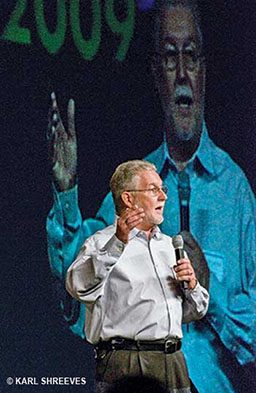
Orr and Huffman were married in 1986. Their Miami Vice-themed wedding featured masks, fins and snorkels and included members of their ever-growing scuba family. The newlyweds moved to Tallahassee, Fla., two years later, where Orr worked at Florida State University (FSU), revising the diver-education programs and extending academic credit for them. He initiated a monthly dive-safety seminar series and encouraged institutional collaboration between area organizations through outreach trainings. Orr also served as diving safety officer for the first mixed-gas workshop conducted by the FSU Coastal and Marine Laboratory and Wakulla Springs State Park.
In 1991 Orr accepted a full-time position at DAN in Durham, N.C. Hired as the training coordinator, he was tasked with developing an oxygen first aid program, which debuted at the Diving Equipment and Marketing Association (DEMA) show just two weeks after he started the job. He worked to develop a short, skills-focused module and took it on the road, spending the next few years teaching anyone who expressed interest.
“Today, oxygen first aid is a safety standard in the diving community. These initial efforts built the foundation for decades of successful safety programs at DAN,” said Bill Ziefle, DAN president and CEO. “That’s a tribute to Dan Orr’s passion for diving, teaching and preparing people to respond to the unexpected.”
Orr spent most of those first few years at DAN on the road, sleeping in dive shops and motels to train divers, instructors and instructor trainers in oxygen first aid. He also played a key role in introducing the program to Europe and Australasia.
“Dan leads by example,” said Keith Sahm, general manager at Sunset House on Grand Cayman. “There is a saying in the senior Coast Guard leadership: ‘Leaders are individuals that guide or direct by showing the way.’ Dan Orr demonstrates that with the highest standard of professionalism and personal integrity.”
Showing the Way
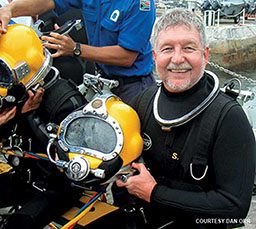
During his 22 years of service at DAN, Orr held various positions, including president and CEO. He spent many years traveling the world, walking into dive shops, speaking at dive clubs and trade shows, diving and training divers. He has also used grassroots approaches to educate divers about DAN and to further DAN’s mission to enhance diver safety. He is known for stepping aboard dive boats and inspecting the oxygen unit. He leaves copies of Alert Diver on airplanes, in hotel lobbies and at the dentist’s office. At any given moment, chances are good that there is a DAN membership brochure in his back pocket.
“Dan is extremely dedicated to education and sees it as an embodiment of DAN’s commitment to enhancing dive safety,” said Dr. Nick Bird, former chief medical officer of DAN. “Education is how we effect change, empower people to provide medical assistance and engender a preventive mindset and culture of safety. A driving force in Dan Orr’s life — demonstrated by his tireless work and many accomplishments — is his desire to enhance the enjoyment and safety of diving.”
Over the years Orr has held membership and leadership positions in many notable diving organizations, including NAUI, PADI, Association of Canadian Underwater Councils (ACUC), YMCA, National Academy of Scuba Educators (NASE), International Association of Nitrox and Technical Divers (IANTD), Undersea and Hyperbaric Medical Society (UHMS), National Association for Cave Diving (NACD), DEMA, American Academy of Underwater Sciences (AAUS), the Institute of Diving, The Explorer’s Club and the Historical Diving Society (HDS).
HDS cofounder Leslie Leaney remembers meeting Orr several times at dive shows and industry events over the years. “It soon became obvious to me that Dan was a consummate diving diplomat and politician, which is just what the Historical Diving Society needed at the helm,” Leaney said. “We worked together on a few nonprofit projects, and Dan eventually became chairman of HDS, and he has never disappointed.”
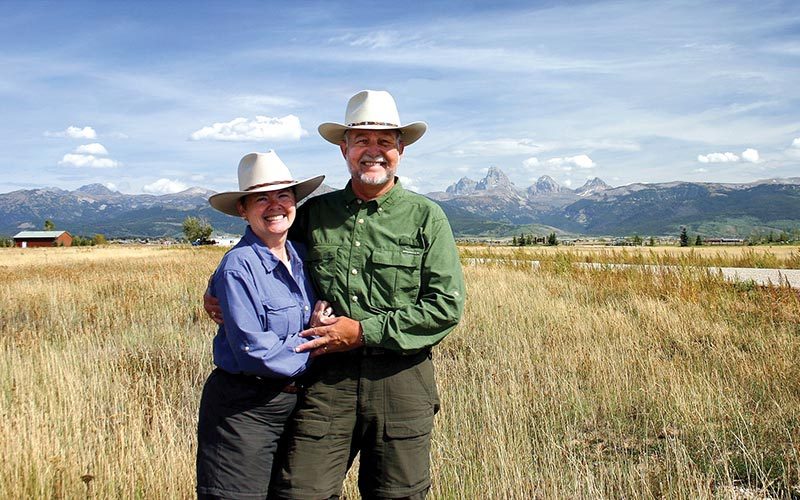
Tom Ingram, executive director of DEMA, echoed Leaney’s sentiments. “Dan served as secretary of the DEMA board of directors for six years beginning in 2005. I recall that his election brought tremendous credibility to DEMA.”
Orr has written countless articles and coauthored several books on dive safety, has served as a consultant for various safety forums and equipment manufacturers, championed safety initiatives such as DAN’s Lionfish Awareness campaign and personally created and funded the DAN Scuba Diving Safety Internship, which fosters young people interested in diving and medical research.
“I’m honored by the awards I’ve received over the years, but it really is the people — the people in this industry and each of the students I’ve had the pleasure of certifying over the years — who have meant the most to me,” Orr said. “I’m retiring from being president emeritus of The DAN Foundation, but Betty and I will never retire from the people we love. They are part of who we are, and diving is part of who we are, too. We’ll continue to share our knowledge through presentations, diving and writing.”
In addition to diving, the Orrs share passion for traveling, fly fishing, hiking, wildlife photography and spending time with Dan’s two children and three grandchildren. “We enjoy doing everything,” Orr said, “as long as we’re doing it together.” The Orrs plan to set up base camp in Teton County, Idaho, where they will continue to seek new adventures and explore life — together.
© Alert Diver — Q3 Summer 2013